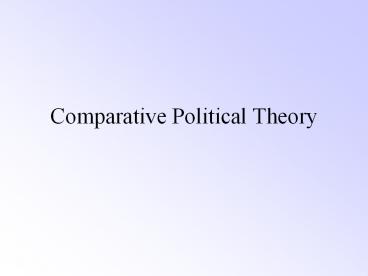Comparative%20Political%20Theory - PowerPoint PPT Presentation
Title:
Comparative%20Political%20Theory
Description:
Comparative Political Theory ... broad concept that includes all the public institutions & individuals that ... to government or administration to ... – PowerPoint PPT presentation
Number of Views:569
Avg rating:3.0/5.0
Title: Comparative%20Political%20Theory
1
Comparative Political Theory
2
Benefits of the Comparative Method
- Can help us make sense of confusing global system
better understanding of forces that bring
political change, significance and impact of
change - Can help us understand ourselves better
understanding of the character, origins,
strengths weaknesses of our own system
3
Benefits of the Comparative Method
- Can broaden our options how similar problems
are approached by different governments perhaps
offer ideas that might help improve the way we do
things or avoid mistakes - Can broaden our horizons avoid ethnocentrism
appreciate variety
4
Benefits of the Comparative Method
- Can help us draw up rules about politics the
study of different political systems can help us
develop and test explanations of the trends
underlying principles of politics - Can help us develop a more sophisticated
understanding of politics in general
5
Benefits of the Comparative Method
- including the nature of democracy and
nondemocratic govt, the relationships between
govt and people, other concepts processes - Can help us understand the linkages between
domestic international affairs
6
Benefits of the Comparative Method
- Can assist explanations why are some
countries stable democracies and not others? Why
do many democracies have prime ministers instead
of presidents?
7
The Comparative Method
- Comparison is not about deciding which political
system is best!! - The purpose is to learn more about how and why
political systems are different or the same and
what effect the differences similarities have
8
The Comparative Method
- NORMATIVE POLITICAL THEORY purpose is to get us
to think coherently about the ultimate aims of
politics to think through possible consequences
of alternative courses of political action - It often asks us to make value judgments
9
The Comparative Method
- NORMATIVE POLITICAL THEORY
- What is the best form of government?
- What ought to be the main goals of political
action? - How do we define these goals in practical
circumstances?
10
The Comparative Method
- EMPIRICAL ANALYSIS centered on facts
- Seeks to discover, describe, and explain facts
and factual relationships, to the extent that the
facts are knowable - Probes the what, the how, and the why of
politics
11
The Comparative Method
- EMPIRICAL ANALYSIS
- What is democracy and how does it work?
- How do people behave in politics?
- What is a military dictatorship?
- Why does it tend to occur in some countries but
not in others?
12
The Comparative Method
- EMPIRICAL ANALYSIS
- Tends to be a value-free political science
- Requires us to keep our investigations of
political reality free from our own particular
values and biases, no matter how well-intentioned
our convictions are
13
Key Concepts
- The State
- A broad concept that includes all the public
institutions individuals that exercise power - A monopoly of force over a specific geographic
territory - Sovereign
14
Key Concepts
- The Nation
- A psychological concept
- Cultural, linguistic and other identities that
can tie people together - Can use the word ethnic here
15
Key Concepts
- The Government
- Particular set of institutions people
authorized by formal documents to pass laws,
regulations, provide protection, etc. - Exercises state power but rarely holds all the
power - Limited by the existing regime
16
Key Concepts
- The Regime
- Sets of rules and institutions that control
access to, and the exercise of, political power - These endure from government to government or
administration to administration (in American
terms) - Regime change occurs when these rules
institutions have been replaced































